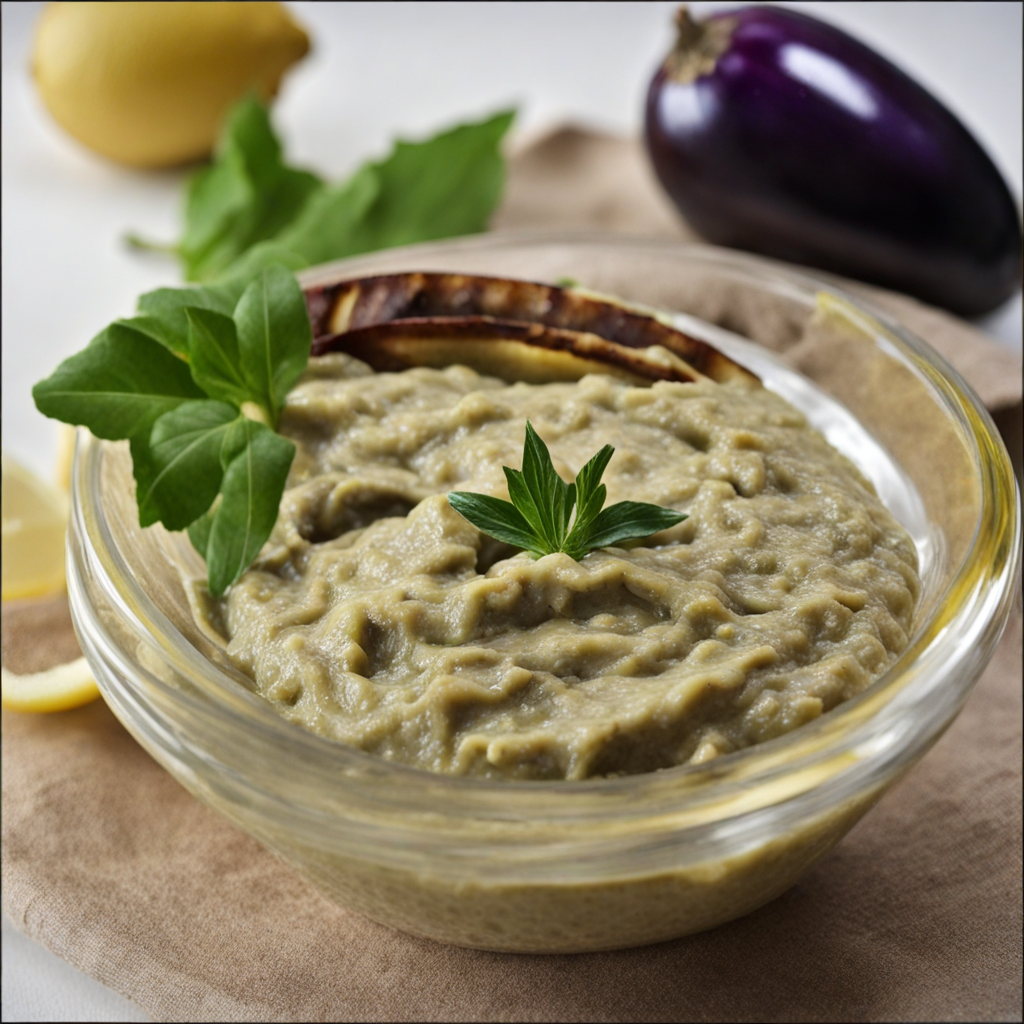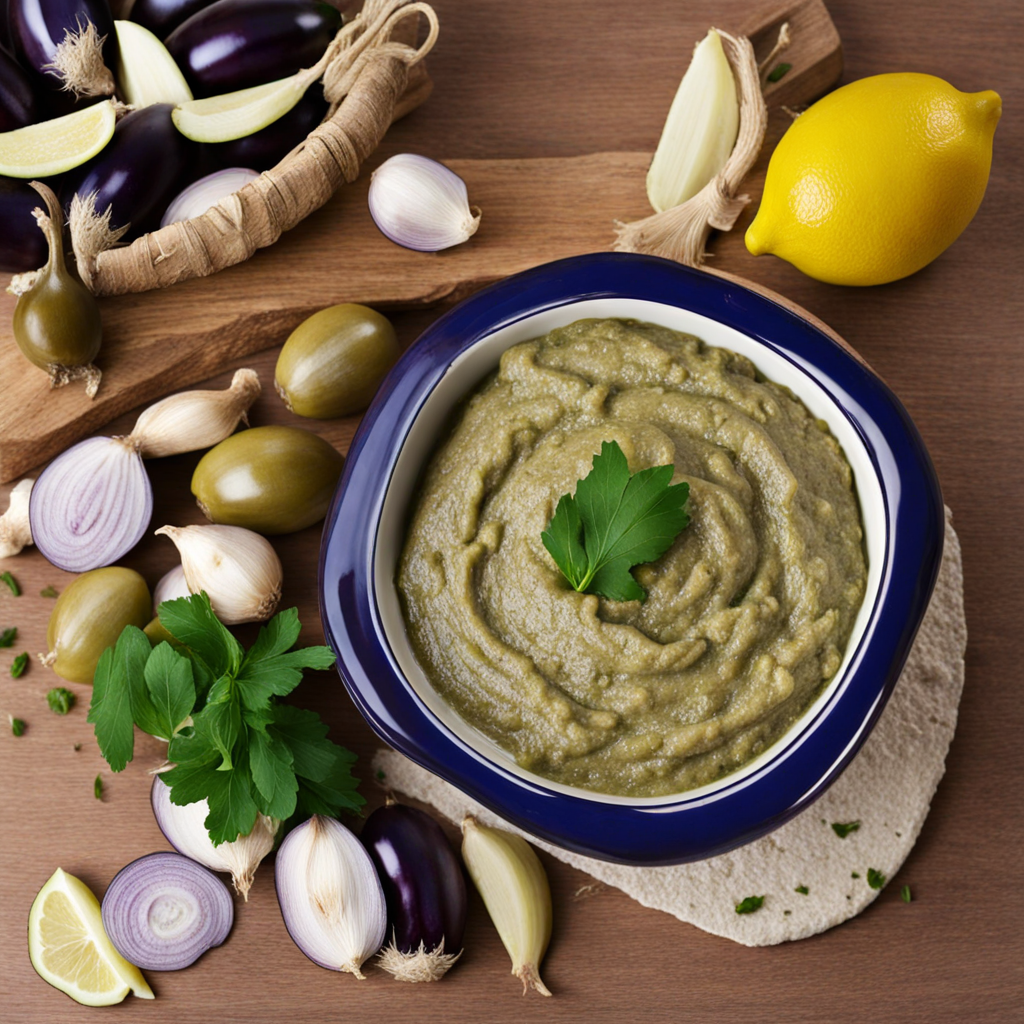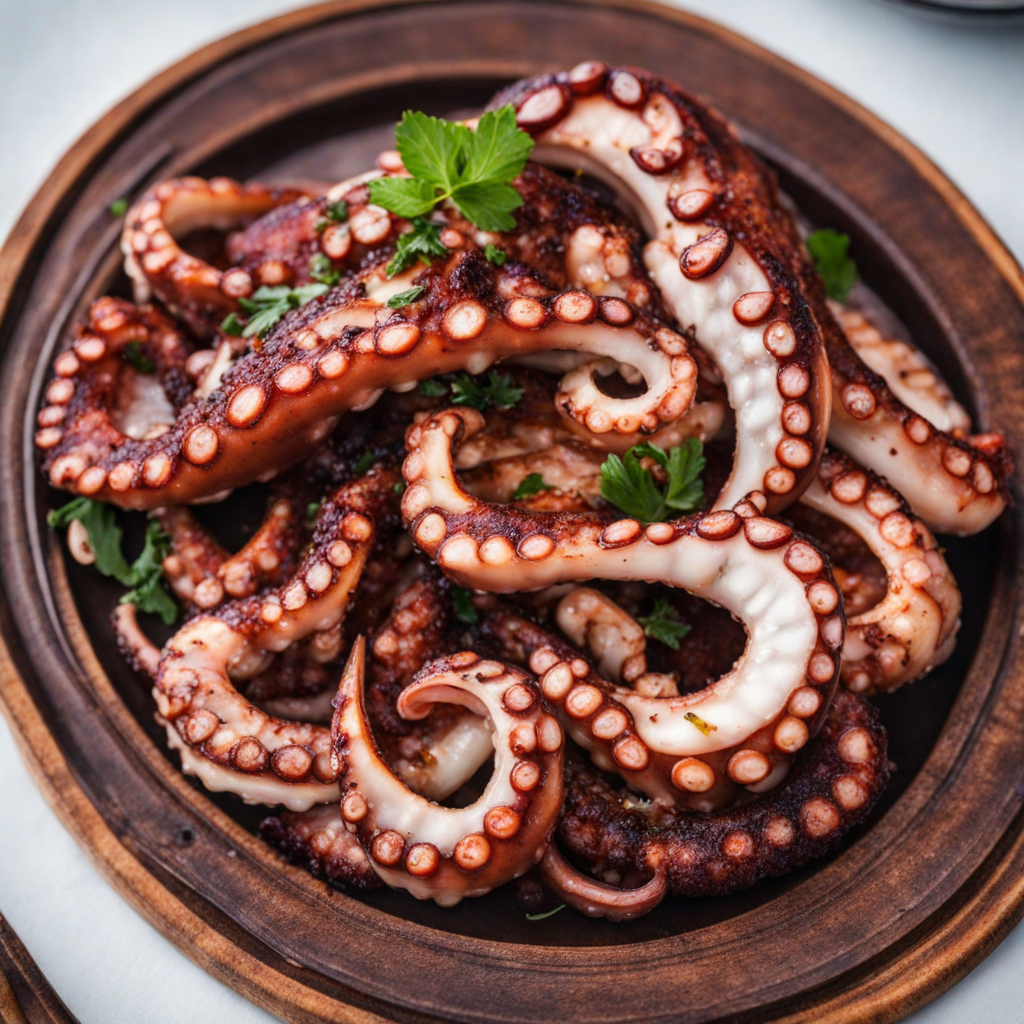Melitzanosalata
Melitzanosalata is a traditional Greek dip that showcases the rich, smoky flavor of roasted eggplant. The dish starts with ripe eggplants that are charred over an open flame or roasted until their skins are blackened and their insides are tender. This cooking method imparts a deep, smoky essence to the eggplant, setting the stage for a vibrant and flavorful dip. Once cooled, the flesh is scooped out and combined with a blend of ingredients, including garlic, olive oil, lemon juice, and sometimes tahini, resulting in a creamy and luscious texture that's perfect for spreading or dipping. The flavor profile of Melitzanosalata is a delightful balance of smokiness, tanginess, and a hint of sweetness from the roasted eggplant. The addition of garlic contributes a sharp bite, while the olive oil enriches the dip with a velvety mouthfeel. Lemon juice brings a refreshing brightness, cutting through the richness and elevating the overall taste experience. Often garnished with a sprinkle of fresh herbs like parsley or mint, Melitzanosalata is both visually appealing and bursting with flavors that evoke the essence of the Mediterranean. This dip is typically served as part of a meze platter, alongside other Greek dishes such as tzatziki, dolmades, and olives. It pairs beautifully with warm pita bread, fresh vegetable sticks, or even as a condiment for grilled meats. Whether enjoyed at a bustling taverna or made at home for a casual gathering, Melitzanosalata invites you to immerse yourself in the vibrant culinary traditions of Greece, offering a unique taste that is both comforting and sophisticated.
How It Became This Dish
The History of Μελιτζανοσαλάτα: A Culinary Journey Through Greece Introduction: A Taste of Greece Among the myriad of culinary delights that Greece has to offer, Μελιτζανοσαλάτα (Melitzanosalata), or eggplant salad, stands out as a delicious and culturally significant dish. A staple in Greek cuisine, this salad embodies the essence of Mediterranean flavors, with its smoky, creamy texture and fresh ingredients. The history of Μελιτζανοσαλάτα is a flavorful narrative that reflects the agricultural traditions, regional influences, and communal practices of Greek society. Origins: The Eggplant in Greece The story of Μελιτζανοσαλάτα begins with the eggplant, or "μελιτζάνα" (melitzana) in Greek. This vegetable has a storied past, believed to have originated in India and subsequently spreading to the Middle East and Mediterranean regions. Historical records suggest that eggplants were cultivated in ancient Persia as early as the 5th century BCE. By the time they reached Greece, the eggplant was already a well-established crop, appreciated for its versatility and unique flavor. Eggplants were initially met with skepticism by some ancient Greeks, who thought them to be toxic or even a cause of madness. However, as agricultural practices evolved and food preferences changed, the eggplant began to gain acceptance and popularity. By the Byzantine period, it was incorporated into various dishes, laying the groundwork for its role in the development of Μελιτζανοσαλάτα. Cultural Significance: A Symbol of Greek Hospitality In Greek culture, food is more than mere sustenance; it is a symbol of hospitality, community, and shared experiences. Μελιτζανοσαλάτα is often served as an appetizer or meze, alongside other traditional dishes such as tzatziki and hummus. It is a dish that brings people together, often enjoyed with crusty bread and a glass of ouzo or wine. The communal aspect of dining in Greece is reflected in the preparation of Μελιτζανοσαλάτα. Traditionally, families would gather to grill the eggplants over an open flame, allowing the smoky aroma to fill the air. This act of cooking became a social event, where stories were shared, laughter echoed, and memories were created. The dish, therefore, carries with it not just flavors but also a sense of belonging and togetherness. Ingredients and Preparation: A Culinary Art The beauty of Μελιτζανοσαλάτα lies in its simplicity and the freshness of its ingredients. While regional variations exist, the core components typically include grilled or roasted eggplant, olive oil, garlic, lemon juice, and sometimes herbs like parsley or mint. Some recipes may incorporate yogurt or tahini, adding creaminess and depth to the dish. The preparation of Μελιτζανοσαλάτα is an art form that highlights the importance of technique. The key to achieving the perfect flavor profile lies in the roasting of the eggplant. Grilling it over an open flame imparts a distinctive smokiness that is essential to the dish. Once cooked, the eggplant is mashed or pureed and mixed with the other ingredients, creating a spreadable dip that can be enjoyed in various ways. Regional Variations: A Reflection of Local Traditions As with many traditional dishes, Μελιτζανοσαλάτα has evolved over time, leading to regional variations that showcase local ingredients and culinary practices. In the islands, for instance, you may find versions that incorporate sun-dried tomatoes or capers, reflecting the unique agricultural products of those areas. In mainland Greece, the addition of roasted peppers or walnuts can elevate the dish, adding depth and complexity. Additionally, the dish has garnered international attention, inspiring adaptations in various cuisines. In places like the United States, where Mediterranean diets have gained popularity, recipes for eggplant salad have incorporated diverse influences, from Middle Eastern spices to contemporary cooking methods. This globalization of Μελιτζανοσαλάτα highlights its versatility and enduring appeal. Modern Context: A Culinary Revival In recent years, there has been a resurgence of interest in traditional Greek cuisine, with chefs and home cooks alike seeking to preserve and celebrate their culinary heritage. This revival is accompanied by a growing emphasis on the use of fresh, local ingredients, aligning with the principles of farm-to-table dining. As part of this movement, Μελιτζανοσαλάτα has found its way onto the menus of modern restaurants and eateries, often presented with a contemporary twist. Chefs experiment with flavor profiles, incorporating ingredients like smoked paprika, feta cheese, or even pomegranate seeds. This evolution demonstrates that while the dish has deep roots in tradition, it is also adaptable to modern tastes and sensibilities. Conclusion: A Dish That Tells a Story The history of Μελιτζανοσαλάτα is a testament to the rich tapestry of Greek culture and its enduring connection to food. From its origins in ancient agriculture to its role in contemporary dining, this eggplant salad has transcended time and geography, evolving while remaining true to its roots. It is a dish steeped in tradition, yet it continues to inspire creativity and innovation. As we savor a spoonful of Μελιτζανοσαλάτα, we are not just enjoying a delicious salad; we are partaking in a culinary legacy that speaks to the heart of Greek identity. It is a reminder of the importance of community, the joy of cooking, and the power of food to bring people together. Whether enjoyed at a family gathering, a festive celebration, or a quiet meal at home, Μελιτζανοσαλάτα invites us to connect with one another, celebrate our heritage, and relish the flavors of life.
You may like
Discover local flavors from Greece







